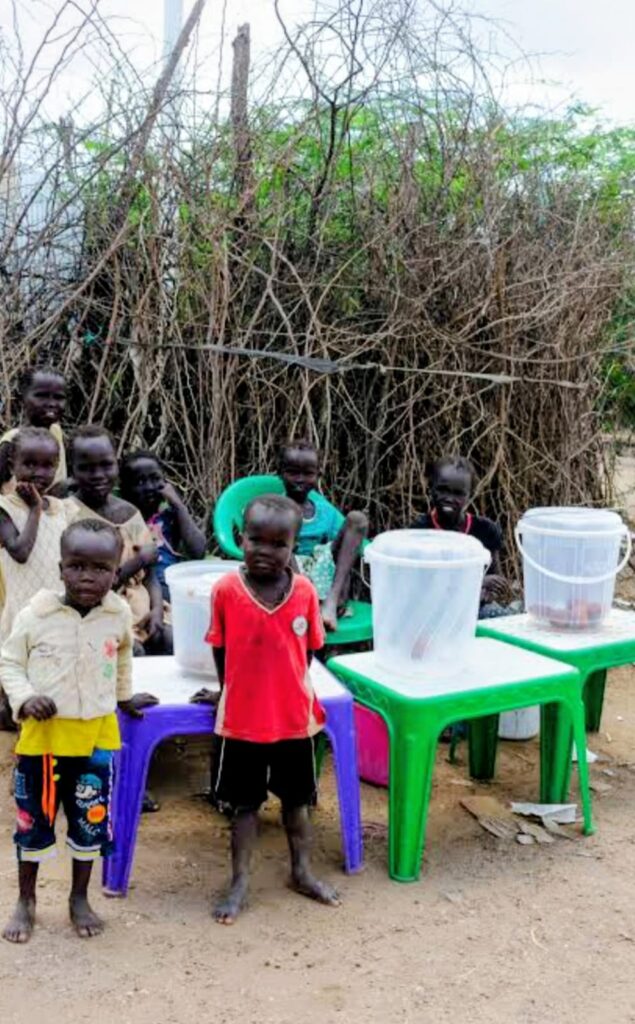Unemployment in one of the biggest struggles in Turkana County, especially for the thousands of refugees living in Kakuma and Kalobeyei. When people outside hear the word “refugee”, they often think of of food aid or shelters. But behind that image are real lives affected by joblessness, hopelessness and lack of opportunities.
Unemployment in Kakuma Refugee and Kalobeyei Settlement is not just a statistic on a report. It’s an everyday reality that eats away at people’s dignity. The camps host refugees from Somalia, South Sudan, Ethiopia, Congo, Brundi and many other countries. Many of them had jobs, businesses, tailors, mechanics, farmers, even engineers. But when they fled from war or persecution, they left behind their work, their land, their tools and their right to work freely.
Jobs here in the camps are inadequate. The few available are shared between the host community and the Refugees, but refugees are often paid far less. This isn’t just an economic problem. It affects education and mental health. To truly understand the job crisis in the Refugees, we need to go beyond the numbers and look at the human stories.
A Day in the Life: What “No Work” Really Looks Like
Forget official unemployment rates for a minute. Let’s talk about what life looks like when you have no job and no clear future.
The sun rises early in Kakuma and Kalobeyei. The heat comes fast and hard. There is no alarm clock buzzing because there is no workplace waiting for you. The day stretches ahead, as empty as the yesterday.
For many graduates, morning start with a slow walk. You see them gathering under a tree, running tap places, in small groups and some just sitting silently. Hope is the only thing they carry with them. May be today, someone will announce applications for a few temporary jobs. They pass their time with playing games like Ludo a manual one. Romors is there relief of the day. “Did you hear of any work?” The answer is almost always “No”
By midday, the sun burns overhead. The men walk back to their shelters. Some play cards. Some nap. Some just stare at the sky thinking which could turn their hair grey. Idleness feels heavy. The hardest part is the empty wallet, it is seeing no clear future ahead of them.
For women, the day is filled with survival chores. They fetch water under the blazing sun, stand in line for the little food they receive according to their categories. Cook over open fires. These tasks take hours but leave no time for building income or future plans. After the chores, they sit in small, sweltering shelters worrying. Worrying about school fees, especially uniform and some books since education is free. Worrying about how to stretch the food for the rest of the month. Worrying about the hopeless look in their husband’s eyes.
This isn’t rest. This isn’t a holiday. It’s a slow grind that steals energy and dignity. It affects children too. Kids see their parents idle and begin to loose hope. Many teenagers finish high school with dreams, but only those who score C+ or above get sponsored to university. The majority of the graduates below C+ stay home idle or try to repeat classes, and most end up stuck in the same cycle of unemployment.
The Pay Gap’s Dirty Secret
As everyone knows, aid organisations are the primary employers in Kakuma and Kalobeyei. The majority of the formal jobs that are available are provided by them. However, a two-tiered pay structure is a silent reality that many people are reluctant to discuss. Introducing James, a Congolese refugee. He is fluent in three languages. He translates private medical data for patients and physicians six days a week at a health clinic. It’s a significant position. Each month, he earns 6,000 Kenyan Shillings. It is referred to as a “incentive wage” by the organisation. His Kenyan coworker makes 25,000 KSH for putting in the same amount of work and hours.
This is exploitation masquerading as policy, let’s face it. It sounds like a bonus because of the word “incentive.” Paying refugees much less because you can is what everyone on the ground understands. James’s salary could be used to purchase soap, beans, and maize flour. It will never pay for his children’s schooling, rent outside the camp, or emergency savings. It’s not meant to help him advance; it’s meant to keep him alive.
James is not the only victim of this system. It creates subdued animosity. Refugees believe they are not valued. They are viewed as cheap labour by the host community. Rather than promoting unity, it sets the poor against one another. Additionally, it produces a persistently impoverished underclass. This must be the first thing to change if we are to believe in equality. Pay should be the same for the same work. Hypocrisy is anything less.
Why Unemployment Hurts Everyone
Individual refugees are not the only ones affected by unemployment. It affects everyone in the community, including residents. Poverty increases when thousands of people are unable to find employment. Aid dependency increases. Families are forced to live on food rations because they cannot afford a variety of foods or basic necessities. Parents who are unable to pay school fees cause their children to drop out.
Youth idleness breeds despair. Frustration can lead to crime or social unrest, and hopelessness can lead to frustration. People lose faith in peaceful solutions when they feel invisible and unimportant. The host community is also negatively impacted. They view refugees as competition for scarce jobs rather than as an advantage of having skilled workers in the area. Tensions increase. A relationship that could be mutually beneficial turns into one of mistrust and animosity.
That is why tackling unemployment in Kakuma Refugee and Kalobeyei Settlement isn’t just good for refugees it’s for everyone.
Practical Solutions That May Actually Be Effective
We are aware of the issues. What can we do is the actual question. These realistic, doable suggestions have the potential to effect change.
Correct training and education
Only the best students currently receive financial aid for their further education. Most people are left behind. Establish appropriate skill centres in the camps rather than sending a select few to college. Use authentic certifications and toolkits to instruct hands-on courses. Skills that can quickly lead to income include installing solar panels, repairing cell phones, tailoring, sustainable farming, and basic nursing. Instead of token investments like one sewing machine for a class of fifty, these programs require actual funding.
Make equitable compensation a mandate.
The nations and organisations that fund these aid organisations are known as donors, and they have the final say. “Equal pay for equal work is a condition of our money,” they ought to state. Organisations will adapt when funding demands equity. The quickest and most equitable way to lessen inequality is through fair pay.
Provide actual loans to microbusinesses.
Give families small loans with assistance in place of incessant food rations. A mother can purchase a refrigerator to sell cold beverages with a $150 loan. Someone can launch a small poultry business with a $100 loan. For a few months, combine the loan with rudimentary business mentoring. This fosters independence rather than long-term reliance.
Partner with Brave Companies
Many businesses around the world require skilled artisans or remote workers. In Kakuma, a tech company might establish a tiny digital hub. The talented tailors in the camp could be hired by a clothing company. These are wise investments in dependable employees, not charitable endeavours.
Promote the right to employment
In the end, the Kenyan government can give refugees additional employment rights. Currently, it is illegal for refugees to work outside of camps. Modifying this policy would allow qualified individuals to make contributions to the national economy. It’s smart economics as well as the right thing to do.

Conclusion: Work Brings Dignity
This crisis is more than just an economic one at its core. It has to do with honour. A job is more than just a source of income. It’s the capacity to look your child in the eye and declare, “I can support you.” It’s the sense of accomplishment you get from applying your abilities. It’s the hope that things will be better tomorrow than they are today.
The residents of Kalobeyei and Kakuma are not requesting alms. They are requesting an equal opportunity to work, earn money, and start a life. We have the concepts. We possess the necessary resources. The will to act is what’s lacking. Instead of keeping people waiting forever, it’s time to choose solutions that empower them. It is beneficial for refugees to invest in employment. The host community benefits from it. Both humanity and Kenya benefit from it. For all of us, the world is more stable and just when everyone has an opportunity to contribute. Now is the moment to create that world.

